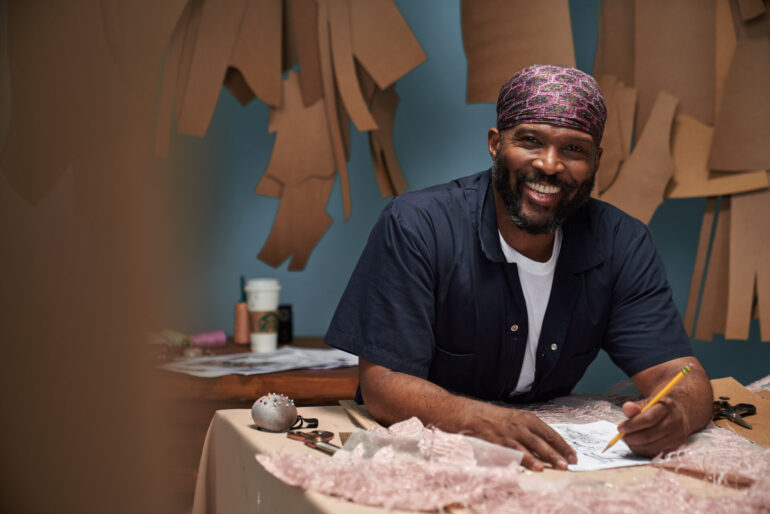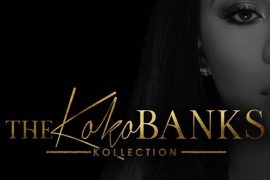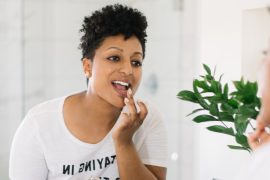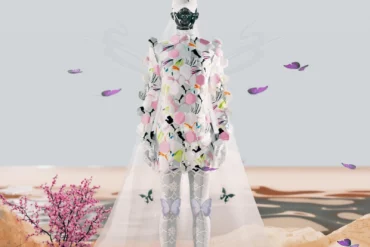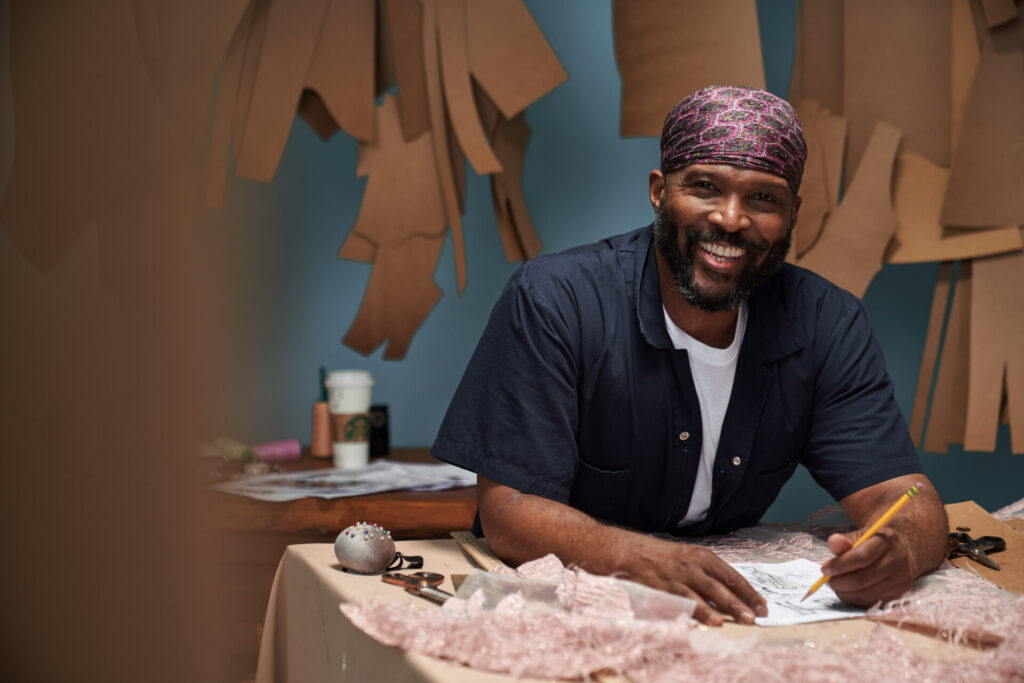
I first met Byron Lars after just graduating from the Fashion Institute of Technology. I was hell-bent on becoming a stylist—a job that would allow me to freelance and still hang out with my night-club friends. Somehow I convinced a photographer friend that I was able enough to style a Japanese scarf campaign. I soon found out that I was over my head and I needed help sourcing clothing for this shoot. I had a pretty decent budget for this one particular look—the clients had a very definite idea of what they wanted which was an exact replica of a Milanese designer’s runway. With no other options, I did the only thing I could think of— put a handwritten post in the hallway at my old college asking a design student to drape and sew the look.
That’s when I had the amazing luck of Byron Lars answering my post who also attended FIT. We met and I was immediately comforted by his big confident smile— he assured me he could make the look over the weekend. Would he be able to replicate the gold lace full bodysuit and a velvet blazer? I didn’t sleep a wink that weekend worrying.
Monday morning came and so did shoot day. I blazed over to Bryon’s studio in a cold sweat knowing my life was on the chopping block. But there she was in her gilded glory on a dress-makers form— a perfect copy of the look the client requested. Byron’s talent truly saved me from complete embarrassment and failure that day.
From that day, I gained a deep admiration for fashion designer, Byron Lars. Flash forward to 1993 and his Heidi fashion show. Somehow he remembered me and instructed his PR to issue a ticket to this no-body stylist assistant and I attended my first fashion show on the balcony of a historic New York theater. I watched awestruck as the Swiss-Miss models paraded on stage and on the runway. The hats and shoes truly rivaled Alexander McQueen shoes and Stephen Jones millinery—the show was a tour de force.
Byron’s trajectory seemed clear. He started his own label starting in 1991 and in the same year, WWD named him Rookie Of The Year. Over the course of his career, he has designed dresses for Michelle Obama and had huge success designing black Barbie dolls. Although his natural aptitude and skill as a designer has been largely under the radar, he achieved steady success with retailers with his Bryon Lars Beauty Mark collection which has since closed due to the pandemic. But his talent was overlooked by the luxury behemoths like LVMH when they were searching for candidates to design for their heritage brands as stated in the September article of The New York Times ( see link below).
The Black Lives Matter movement forced the industry to reexamine every aspect of the business including designers, models, and other creatives who didn’t have a considerable seat at the fashion table. This rethinking put a spotlight on black designers and Byron in particular as evidenced in fashion journalist, Teri Agins feature article in The New York Times. The well-respected journalist shined a bright light on Byron’s quiet but persistent career including his long collaboration with Anthropologie.
https://www.nytimes.com/2020/09/09/style/fashion-byron-lars-is-still-here.html
But this man is just getting started. Byron’s third act is already in play with a new label called In Earnest—part middle name,(Byron Earnest Lars), part expression of his tenacity in the fashion milieu. Below is a Q+A with Byron Lars.
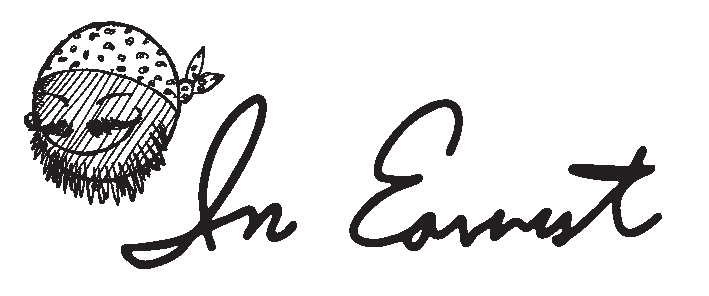
Can you talk a bit about designing for Anthropologie ?
“Designing for Anthropologie is the same as designing for my girl “In Earnest”, which is how we approach every aspect of this newest iteration of fashion and also the namesake of the new label itself. We know she wants something that she doesn’t already have, something fun to look and feel good in, and In Earnest is pleased as punch to give it to her. ”
https://www.anthropologie.com/brands/in-earnest-by-byron-lars
___________________________________________________________________________
“I would have to say that all the black fashion designers which I knew of before throwing my proverbial hat in the ring, inspired me immensely by their very existence as living (or posthumous) proof that such a career was even viable for an African American.”
Byron Lars
Are there any black fashion designers who you can cite as an influence or inspiration / role model for your foray into design?
I would have to say that all the black fashion designers which I knew of before throwing my proverbial hat in the ring inspired me immensely by their very existence as living (or posthumous) proof that such a career was even viable for an African American. In the late 1980’s the only black designers I knew of were Anne Lowe, Stephan Burrows, Willi Smith. Kevin Hall (with whom I was thrilled to have interned) and Patrick Kelly which were plenty enough to inspire my march forward to start my own first label in the 90s.
My early twenties self however was almost as encouraged as disheartened by the later discovery of there having been so many other black designers of whom I had never heard because they had been completely ignored by the fashion magazines which (before having access to WWD) had been the only means by which I could have known of them.
____________________________________________________________________________
Did you find that being a black in the fashion industry was a positive negative or had no bearing on your career.
It would be utterly absurd of me to suggest that my being black had no bearing on my career but, until this recent “black moment” to which we chiefly owe to two very tragic events have occurred while we were all forcibly quieted to watch and actually SEE the overarching and longstanding implications), I never really allowed myself ponder the irrefutable inequities of the fashion industry simply because they were not that stuff of which get-up-and-go is made. That being said, it’s very liberating to be able to actually have an honest conversation about it now, since we will all have to be stewards of any advances made toward inclusivity, that instead of enduring, could easily be overtaken by a new and more chic veneer posing as social change.
_________________________________________________________________________
Is there someone who has been a mentor or supporter of you during your career
Fashion Journalist, Author and dear friend Teri Agins has always been an avid supporter of me and my work but, she has been my absolute champion through the scripting of this third act and for that, I am truly grateful!
____________________________________________________________________
What’s your take on the current state of the fashion industry? Where do you think it’s going after the pandemic subsides?
The current state of fashion and of the world, in general, is certainly NOT for the faint of heart but, there is undeniable alchemy at work forging myself and everyone and everything around me into something new and that’s exciting! The comfort and functionality imperative brought on by our new digital existences isn’t going away anytime soon, but In Earnest speaks to the return of that aspirational verve that makes hearts yearn for something more in this new reality…at least that’s what I’m shooting for!




